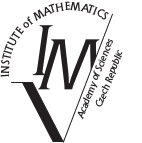Tutorial Track
W. Brian: Automorphisms of $\mathcal P(\omega) / \mathrm{Fin}$
I'm going to talk about an old question of van Douwen: Are the shift map and its inverse conjugate in the automorphism group of P(ω)/fin? By the mid 1980's, van Douwen and Shelah proved that it is consistent they are not conjugate. Specifically, any automorphism witnessing their conjugacy would need to be nontrivial (van Douwen), but it is consistent that all automorphisms are trivial (Shelah). In this tutorial I am going to discuss the recently-proved complementary result: it is consistent that the shift map and its inverse are conjugate and, in fact, it follows from CH.
slides I,
slides II,
slides III
S. Unger: Equidecomposition and discrepancy
We will survey some recent results on equidecomposition in the torus. An important component of these results is the notion of discrepancy. In its simplest form, discrepancy for a measure $\mu$ is the supremum over intervals $I$ of $\vert \mu(I) - \lambda(I) \vert$ where $\lambda$ is Lebesgue measure. Numerical bounds on discrepancy for a sequence of measures $\mu_n$ can be used as input to (measurable) solutions to problems of equidecomposibility. This series of tutorials will contain joint work with Andrew Marks and with Anton Bernshteyn and Anush Tserunyan.
slides I,
slides II,
slides III
J. Väänänen: Inner models from extended logics
In recent joint work with J. Kennedy and M. Magidor the speaker has introduced a family of new inner models of set theory. These arise when in the definition of Gödel's inner model L the role of first order definability is given to definability in an extension of first order logic. The goal is to find new inner models which have the robustness off Gödel's L, which have the power to decide set theoretical questions such as CH, which support large cardinals, and which have some degree of naturality.
slides
Research Track
| Speaker | Title | Abstract/Slides |
|---|
| Julia Ścisłowska | How to tame the Knaster continuum using the ultrafilter orders? | abstract slides |
| Szymon Żeberski | Algebraic sums, trees and meager sets in the Cantor space and in the Baire space | abstract slides |
| Tomasz Żuchowski | Ideals on ω and Nikodym vs Grothendieck property of Boolean algebras | abstract slides |
| Adam Bartoš | Uncountable ultrahomogeneous structures II | abstract slides |
| Balázs Bursics | Hyperfiniteness on topological Ramsey spaces | abstract slides |
| David Chodounsky | Closing remarks | |
| Aleksander Cieślak | What does it take to destroy an ideal | abstract slides |
| Hope Duncan | Inaccessible cardinals without choice | abstract slides |
| Lyra Gardiner | Infinite-exponent partition relations on linear orders | abstract slides |
| Yusuke Hayashi | Good coloring for stationary list | abstract slides |
| Jan Hubička | Big Ramsey degrees – current status and open problems | slides |
| Marta Kładź-Duda | Productivity of selective covering properties | abstract slides |
| Jerzy Kąkol | On some applications of $\Delta$-spaces and $\Delta_1$-spaces | abstract slides |
| Yurii Khomskii | Separating Regularity Properties with the Raisonnier Filter | abstract slides |
| Anett Kocsis | Universal graphs under homomorphism | abstract slides |
| Gábor Kun | On the measurable Hall condition | slides |
| Chris Lambie-Hanson | Strongly increasing chains of functions | slides |
| Pedro Marun | Labelled Sets | abstract slides |
| Łukasz Mazurkiewicz | Fake nulls and meagers in the Baire space | abstract slides |
| Marcin Michalski | On algebraic sums, trees and null sets in the Cantor space and the Baire space | abstract slides |
| Adam Morawski | A Small, Unruly Radon–Nikodym Compact Space from a Diamond | abstract slides |
| Francesco Parente | Ultrafilters on the Cohen algebra | |
| Michał Pawlikowski | Scales and combinatorial covering properties | abstract slides |
| Máté Pálfy | Generalized Haar meager sets and related cardinal invariants | abstract slides |
| Carlos Adrian Perez Estrada | Subgroups of big mapping class groups that are not extremely amenable | abstract slides |
| Daria Perkowska | *operation and microscopic sets | slides |
| Robert Ralowski | Peripherally Hausdorff spaces and fixed-point theorem | abstract slides |
| Bryant Rosado Silva | Generalized Ważewski dendrites, generic subcontinua and generic chains | abstract slides |
| Calliope Ryan-Smith | Local reflections of choice | abstract slides |
| Lukas Schembecker | Forcing and combinatorics of Van Douwen families | abstract slides |
| Jonathan Schilhan | Hagendorf Orders | |
| Šárka Stejskalová | Kurepa and weak Kurepa trees | slides |
| Maximilian Strohmeier | Categorical Partite Construction | slides |
| Jaro Supina | Slaloms, cardinal invariants, and selection principles | abstract slides |
| Jarosław Swaczyna | Some countable Rado-like graphs via Fraisse limits | abstract slides |
| Toshimasa Tanno | Generalized Tukey relation in Solovay model | abstract slides |
| Tristan van der Vlugt | Rearrangement & subseries numbers | abstract slides |
| Wolfgang Wohofsky | $E_0$ trees and translations on the lower (finite) Cantor space | |
| Takashi Yamazoe | Game-theoretic variants of splitting number | abstract slides |
| Krzysztof Zakrzewski | $c_0$-products of function spaces | abstract slides |

